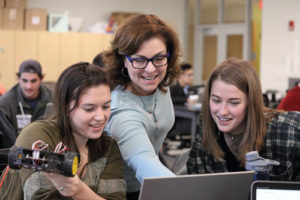Getting more women in STEM fields remains a challenge all over. In the United States, men earn nearly 80 percent of engineering and computer science bachelor’s degrees, even though more than half the country’s population is female. And while underrepresented minority women make up 16 percent of the population, they earn just three and five percent of bachelor’s degrees in engineering and computer science respectively.
The gender gap in engineering and computer science has endured for decades. Earlier this year, the Chronicle of Higher Education highlighted the field’s efforts to address this longstanding problem, issuing its newest rankings for colleges and universities based on their representation of women in engineering and computer science, as reported in the U.S. Department of Education’s Integrated Postsecondary Education Data System.
How UVA is increasing women in STEM
The University of Virginia School of Engineering has emerged as a top choice for women seeking engineering and computer science degrees, ranking third among all U.S. public universities for its percentage of women earning undergraduate engineering degrees—and first among public schools that awarded at least 75 engineering diplomas. UVA also ranks among the top 10 for its percentage of women earning bachelor’s degrees in computer science (29.5 percent), exceeding the national average of 18 percent.
This year, nearly a third of undergraduate and graduate students at UVA Engineering are women, outpacing national averages of 21 and 25 percent respectively.
“We believe it is our responsibility to help widen the pipeline of scientists and engineers,” says Pamela
Norris, executive dean of UVA Engineering and director of UVA CHARGE, a National Science Foundation ADVANCE program designed to increase the representation of women in STEM faculty positions. “Society needs as many highly trained people as possible working together to solve big problems in a broad range of areas, from health care to technology to environmental resilience.”
For women, making a difference is essential
UVA Engineering focuses on using research to tackle entrenched challenges, as evidence shows women and other traditionally underrepresented groups in STEM fields seek opportunities to make a difference.
UVA’s Department of Computer Science has led the way in bringing more female students to the program—and the field—for decades. The department segments its core introduction to computer science course into a set of distinct classes based on students’ stated familiarity with computer science.
In the process, less experienced students, which historically have included women and students from other groups traditionally underrepresented in engineering, can develop confidence in their abilities and bypass a barrier of intimidation. This decision has helped lead more women to pursue computer science as a major—and driven the creation of a course devoted to those who have no experience in, or are nervous about, computer science.
Specific opportunities for women
UVA has also opened up its computer science programs to non-engineering students, creating opportunities for women who traditionally major in other disciplines to pursue a degree in the field. In parallel, computer science faculty have also made a concerted effort to ensure assignments and case studies do not reflect gender biases and stereotypes, which has offset the prevailing narrative that computer science is a male-dominated profession. Women across the program have, instead, seen and noted that they can excel in computer science.
With the support of the department’s Industrial Advisory Board, students have built on this passion, attending national events such as the Grace Hopper Celebration of Women in Computing and Women in Cybersecurity conference. And they have focused on promoting an early, longstanding interest in STEM through the Women in Computing Sciences Club, mentoring elementary, middle and high school girls interested in science.
To bolster its efforts to set female students up for success, UVA Engineering’s Computer Science Department has provided diversity training to undergraduate teaching assistants and paired new faculty with mentors trained in encouraging diversity. As a result, they have the tools to promote inclusive, collaborative environments that help students navigate the barriers they may face in the field.
With support from several National Science Foundation grants, faculty members now train high school and community college teachers across Virginia on how to both recruit and support diverse students in computing.
“We’ve tried to be very proactive in how we recruit, interview, and retain diverse faculty and students,” says Kevin Skadron, chair of the department. “The Chronicle’s rankings affirm our efforts to boost the representation of women in computer science and underscore the importance of continuing our work to boost diversity across the board.”
At UVA Engineering, female students are working alongside researchers to tackle big problems in engineering for health (developing new methods to prevent, diagnose, monitor, and treat disease); engineering for the cyber future (developing and securing the innovative technologies that are continuously making life easier and more efficient); and engineering technologies for a sustainable and connected world (developing high-performing, energy-efficient materials and sustainable systems for energy, water and transportation).
With the support of the school’s chapter of the Society of Women Engineers and groups such as Women in Chemical Engineering, UVA Engineering is positioning more women than ever to address these grand challenges.
- Survey: More students want to go to graduate school - April 24, 2024
- Educause, AWS launch generative AI readiness assessment tool for higher ed - April 23, 2024
- A bungled FAFSA rollout threatens students’ college ambitions - April 19, 2024

